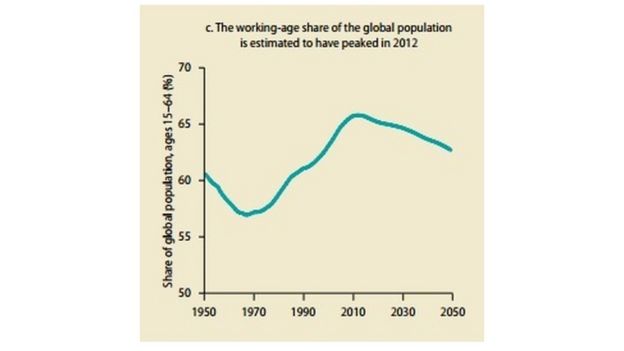Welcome to DU!
The truly grassroots left-of-center political community where regular people, not algorithms, drive the discussions and set the standards.
Join the community:
Create a free account
Support DU (and get rid of ads!):
Become a Star Member
Latest Breaking News
General Discussion
The DU Lounge
All Forums
Issue Forums
Culture Forums
Alliance Forums
Region Forums
Support Forums
Help & Search
General Discussion
Related: Editorials & Other Articles, Issue Forums, Alliance Forums, Region ForumsAre global wages about to turn?
http://www.bbc.com/news/business-34488950"The working-age share of the population peaked in 2012 and is now on the decline." This is probably the single most important sentence published this week from the World Bank and the International Monetary Fund - but it comes from an unlikely source.
The IMF and the Bank are holding their semi-annual meetings in Peru. As usual this is being accompanied by a plethora of reports and forecasts from the two global institutions' staff teams covering the whole gamut of global economic policy.
The headlines have been grabbed by the new forecasts in the World Economic Outlook (WEO) showing a weakening global recovery and particular problems in the emerging economies.
But it's the The Global Monitoring Report, the publication which tracks progress towards the Millennium Development Goals - which rarely gets much attention - that has that crucial line (so crucial it's worth repeating): "The working-age share of the population peaked in 2012 and is now on the decline."
The IMF and the Bank are holding their semi-annual meetings in Peru. As usual this is being accompanied by a plethora of reports and forecasts from the two global institutions' staff teams covering the whole gamut of global economic policy.
The headlines have been grabbed by the new forecasts in the World Economic Outlook (WEO) showing a weakening global recovery and particular problems in the emerging economies.
But it's the The Global Monitoring Report, the publication which tracks progress towards the Millennium Development Goals - which rarely gets much attention - that has that crucial line (so crucial it's worth repeating): "The working-age share of the population peaked in 2012 and is now on the decline."
I had thought this was forecast for a decade or so from now, but it apparently just happened.
InfoView thread info, including edit history
TrashPut this thread in your Trash Can (My DU » Trash Can)
BookmarkAdd this thread to your Bookmarks (My DU » Bookmarks)
2 replies, 565 views
ShareGet links to this post and/or share on social media
AlertAlert this post for a rule violation
PowersThere are no powers you can use on this post
EditCannot edit other people's posts
ReplyReply to this post
EditCannot edit other people's posts
Rec (3)
ReplyReply to this post
2 replies
 = new reply since forum marked as read
Highlight:
NoneDon't highlight anything
5 newestHighlight 5 most recent replies
= new reply since forum marked as read
Highlight:
NoneDon't highlight anything
5 newestHighlight 5 most recent replies
Are global wages about to turn? (Original Post)
Recursion
Oct 2015
OP
yeoman6987
(14,449 posts)1. Oh they will throw a couple shekels to us to get us to shut up
But nothing dramatic.
pampango
(24,692 posts)2. 'Policy still matters' but 'the global glut of workers is set to end - driven by both slowing
population growth and a falling working-age share.'

... for roughly four decades (and especially so in the last two) "labour" has been in broad supply. But if the global glut of workers is set to end - driven by both slowing population growth and a falling working-age share - then that could have major impact on global economics.
Wages up and inequality down?
The Goodhart-Nangle view is that a combination of demographic change and China's entry into the global system can explain some of the bigger trends observed in advanced economies over the past few decades and that the ending of the "sweet spot" could see these trends reverse.
To many the idea that a global demographic change - rather than changing tax rates, the growth of finance, the decline of trade unions or some amorphous concept that goes by the name "neoliberalism" - has driven inequality is contentious.
Policy still matters
National policymakers aren't powerless in the face of global trends - different labour laws, different tax systems and different economic policies will lead shape and shift what happens to wage growth and inequality. But they only shape and shift, they don't fully determine the outcome.
Very interesting article, Recursion. Thanks for posting it.